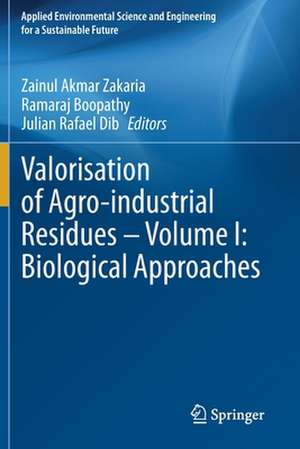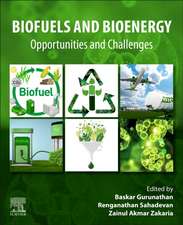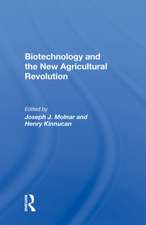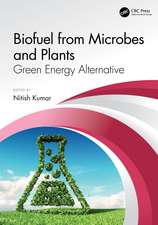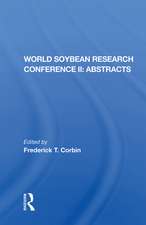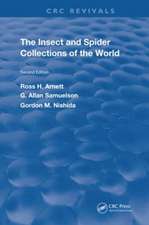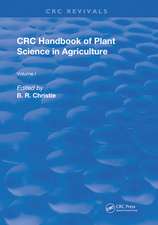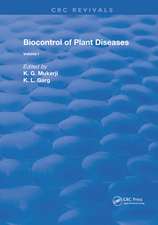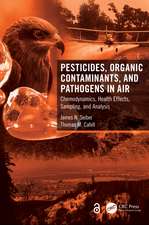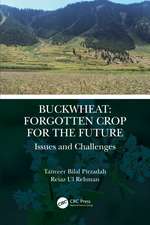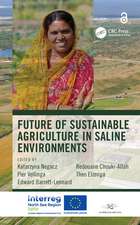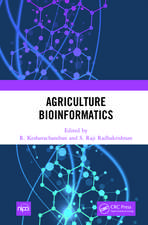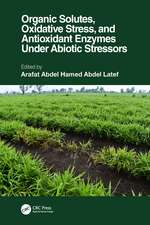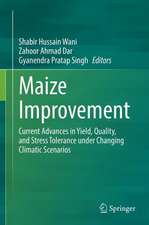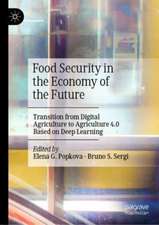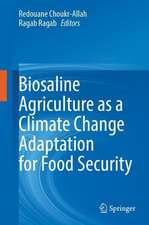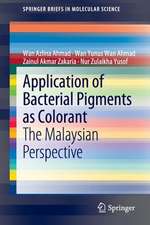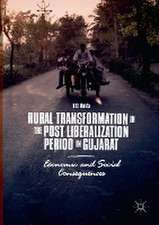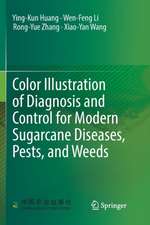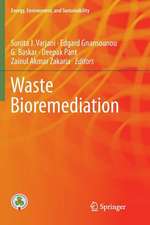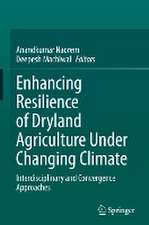Valorisation of Agro-industrial Residues – Volume I: Biological Approaches: Applied Environmental Science and Engineering for a Sustainable Future
Editat de Zainul Akmar Zakaria, Ramaraj Boopathy, Julian Rafael Diben Limba Engleză Paperback – 5 mar 2021
This book presents up-to-date approaches using biological techniques to manage the abundance of waste generated from agricultural and industrial activities. It discusses techniques such as bioconversion, biodegradation, biotransformation, and biomonitoring as well as the utilization of these wastes. A number of chapters also include individual case studies to enhance readers’ understanding of the topics.
This comprehensive book is a useful resource for anyone involved in agricultural and industrial waste management, green chemistry or biotechnology. It is also recommended as a reference work for graduate students and all agriculture and biotechnology libraries.
| Toate formatele și edițiile | Preț | Express |
|---|---|---|
| Paperback (1) | 641.71 lei 6-8 săpt. | |
| Springer International Publishing – 5 mar 2021 | 641.71 lei 6-8 săpt. | |
| Hardback (1) | 647.92 lei 6-8 săpt. | |
| Springer International Publishing – 5 mar 2020 | 647.92 lei 6-8 săpt. |
Din seria Applied Environmental Science and Engineering for a Sustainable Future
- 18%
 Preț: 727.00 lei
Preț: 727.00 lei - 15%
 Preț: 645.28 lei
Preț: 645.28 lei - 15%
 Preț: 653.14 lei
Preț: 653.14 lei - 18%
 Preț: 892.90 lei
Preț: 892.90 lei - 18%
 Preț: 951.47 lei
Preț: 951.47 lei - 18%
 Preț: 1003.38 lei
Preț: 1003.38 lei - 15%
 Preț: 639.73 lei
Preț: 639.73 lei - 20%
 Preț: 576.07 lei
Preț: 576.07 lei - 19%
 Preț: 596.63 lei
Preț: 596.63 lei - 18%
 Preț: 1388.05 lei
Preț: 1388.05 lei - 24%
 Preț: 935.54 lei
Preț: 935.54 lei - 15%
 Preț: 644.30 lei
Preț: 644.30 lei - 18%
 Preț: 1113.89 lei
Preț: 1113.89 lei - 18%
 Preț: 725.61 lei
Preț: 725.61 lei - 18%
 Preț: 895.27 lei
Preț: 895.27 lei
Preț: 641.71 lei
Preț vechi: 754.95 lei
-15% Nou
Puncte Express: 963
Preț estimativ în valută:
122.81€ • 127.74$ • 101.38£
122.81€ • 127.74$ • 101.38£
Carte tipărită la comandă
Livrare economică 15-29 aprilie
Preluare comenzi: 021 569.72.76
Specificații
ISBN-13: 9783030391393
ISBN-10: 3030391396
Ilustrații: XI, 308 p. 33 illus., 18 illus. in color.
Dimensiuni: 155 x 235 mm
Greutate: 0.45 kg
Ediția:1st ed. 2020
Editura: Springer International Publishing
Colecția Springer
Seria Applied Environmental Science and Engineering for a Sustainable Future
Locul publicării:Cham, Switzerland
ISBN-10: 3030391396
Ilustrații: XI, 308 p. 33 illus., 18 illus. in color.
Dimensiuni: 155 x 235 mm
Greutate: 0.45 kg
Ediția:1st ed. 2020
Editura: Springer International Publishing
Colecția Springer
Seria Applied Environmental Science and Engineering for a Sustainable Future
Locul publicării:Cham, Switzerland
Cuprins
Chapter 1: Dark fermentation and bioelectrochemical systems for enhanced biohydrogen production from palm oil mill effluent: current progress, potentials, and future perspectives.- Chapter 2: Spent mushroom substrate as biofertilizer for agriculture application.- Chapter 3: Biological treatment of agro-industrial waste.- Chapter 4: Proteomics of lignocellulose substrates bioconversion in anaerobic digesters to increase carbon recovery as methane.- Chapter 5: Circular economy and agroindustrial wastewater: potential of microalgae in bioremediation processes.- Chapter 6: Utilization of agro-waste as carbon source for biohydrogen production: prospect and challenges in Malaysia.- Chapter 7: Agro-industrial waste as substrates for the production of bacterial pigment.- Chapter 8: Analysis of termite microbiome and biodegradation of various phenolic compounds by a bacterium isolated from the termite gut in louisiana, usa.- Chapter 9: Compatible technologies to anaerobic digestion for the integral valorization of organic waste.- Chapter 10: Recycling and reuse of ayurvedic pharma industry wastes.- Chapter 11: Production of unicellular biomass as a food ingredient from agro-industrial waste.- Chapter 12: Cyanobacterial degradation of organophosphorus pesticides.- Chapter 13: Microbial identification and extracellular polymeric substances characterization of aerobic granules developed in treating rubber processing waste water.- Chapter 14: Granulation and biodegradation by microbial species in granular sequencing batch reactor for soy-sauce wastewater treatment.
Notă biografică
Dr. Zainul Akmar Zakaria is an Associate Professor under the School of Chemical Engineering and Energy Engineering, Faculty of Engineering, Universiti Teknologi Malaysia (UTM). He currently holds the position of Associate Chair at the School as well as heading the UTMBactec Research group where he works on biomass valorization and microbial technology. He has Scopus h-index of 15 and has published 2 Research Books, 5 Edited Books and 10 Book Chapters. One of his research books was awarded the “National Book Award 2018” under the biochemistry category. Dr. Zainul has acted as Guest Editor for Special Issues in 3 ISI-indexed journals, Evaluator for International Research Grant (Saudi Arabia, American Chemical Society, South Africa), Visiting Scientist to Argentina and Mexico as well as Program Head for the UTM-CONICET, Argentina R&D Program (2015-2017).
Dr. Raj Boopathy is an Alcee Fortier Distinguished Service Professor of Biological Sciences at the Nicholls State University, USA. In 2008, Dr. Raj Boopathy received the Nicholls State University’s Presidential Award for Teaching Excellence. He has more than 25 years of research experience in the area of bioremediation and bio-processing. His research involves bioremediation of hazardous chemicals including oil spills, biological treatment of wastewater, antibiotic resistance genes in the environment, and bio-ethanol production. His research work has been cited more than 7,000 times. Dr.Raj Boopathy reviewed research grants for National Science Foundation, Department of Defense, US Environmental Protection Agency, Department of Energy, and numerous private agencies and foreign governments including Singapore, South Africa, Switzerland, Indonesia, and Israel. He is the editor of International journal of Biodeteriortion and Biodegradation (IBB) and on the Editorial Boards of various International journals. Dr. Raj Boopathy received European Union-US biotechnology Fellowship and Leverhulme commonwealth fellowship. He is a Fellow of International Union of Pure and Applied Chemistry (IUPAC), International Bioprocessing Society, and Society for Industrial Microbiology and Biotechnology. Dr. Boopathy was selected as a Fulbright Senior Scholar Specialist to visit various countries for next five years by the US State Department.
Dr. Julián Rafael Dib is currently Adjunct Professor at the National University of Tucumán (UNT) and researcher in PROIMI-CONICET. He received his Bachelor in Biochemistry (2002) and Ph.D. (2009) at the UNT. After completing his PhD, Dr. Dib was granted with a Humboldt Fellowship to work at the University of Münster, Germany. In 2013, Dr. Dib accepted an Adjunct Professor position at the UNT. Much of his work has been on using native killer yeasts as biocontrol agents against postharvest fungal decays in lemons. He has given numerous invited talks and is a consultant to companies involved in fruit postharvest technologies. Dr. Dib has received numerous international awards and scholarships, including from the Fulbright Commission, DAAD, ERAMUS, and the Alexander von Humboldt Foundation. He was visiting professor at Technische Universität München, Germany (2015); Universidad de la República, Uruguay (2015); Universiti Teknologi Malaysia, Malaysia (2016-2019), and University of Innsbruck, Austria (2017).
Dr. Raj Boopathy is an Alcee Fortier Distinguished Service Professor of Biological Sciences at the Nicholls State University, USA. In 2008, Dr. Raj Boopathy received the Nicholls State University’s Presidential Award for Teaching Excellence. He has more than 25 years of research experience in the area of bioremediation and bio-processing. His research involves bioremediation of hazardous chemicals including oil spills, biological treatment of wastewater, antibiotic resistance genes in the environment, and bio-ethanol production. His research work has been cited more than 7,000 times. Dr.Raj Boopathy reviewed research grants for National Science Foundation, Department of Defense, US Environmental Protection Agency, Department of Energy, and numerous private agencies and foreign governments including Singapore, South Africa, Switzerland, Indonesia, and Israel. He is the editor of International journal of Biodeteriortion and Biodegradation (IBB) and on the Editorial Boards of various International journals. Dr. Raj Boopathy received European Union-US biotechnology Fellowship and Leverhulme commonwealth fellowship. He is a Fellow of International Union of Pure and Applied Chemistry (IUPAC), International Bioprocessing Society, and Society for Industrial Microbiology and Biotechnology. Dr. Boopathy was selected as a Fulbright Senior Scholar Specialist to visit various countries for next five years by the US State Department.
Dr. Julián Rafael Dib is currently Adjunct Professor at the National University of Tucumán (UNT) and researcher in PROIMI-CONICET. He received his Bachelor in Biochemistry (2002) and Ph.D. (2009) at the UNT. After completing his PhD, Dr. Dib was granted with a Humboldt Fellowship to work at the University of Münster, Germany. In 2013, Dr. Dib accepted an Adjunct Professor position at the UNT. Much of his work has been on using native killer yeasts as biocontrol agents against postharvest fungal decays in lemons. He has given numerous invited talks and is a consultant to companies involved in fruit postharvest technologies. Dr. Dib has received numerous international awards and scholarships, including from the Fulbright Commission, DAAD, ERAMUS, and the Alexander von Humboldt Foundation. He was visiting professor at Technische Universität München, Germany (2015); Universidad de la República, Uruguay (2015); Universiti Teknologi Malaysia, Malaysia (2016-2019), and University of Innsbruck, Austria (2017).
Textul de pe ultima copertă
Agriculture and industry are the two most important economic sectors for various countries around the globe, providing millions of jobs as well as being the main source of income for these countries. Nevertheless, with the increasing demand for agricultural and industrial produce, huge amounts of waste are also being produced. Without proper management, this waste (both liquid and solid) poses a serious threat to overall environmental quality, mainly due to its toxicity and slow degradation processes. Current approaches are effective but would normally require huge capital investments, are labour intensive and generate potential hazardous by-products. As such, there is a need for alternative approaches that are cheaper, easier-to-handle and have a minimum potential impact on environmental quality.
This book presents up-to-date approaches using biological techniques to manage the abundance of waste generated from agricultural and industrial activities. It discusses techniques such as bioconversion, biodegradation, biotransformation, and biomonitoring as well as the utilization of these wastes. A number of chapters also include individual case studies to enhance readers’ understanding of the topics.
This comprehensive book is a useful resource for anyone involved in agricultural and industrial waste management, green chemistry or biotechnology. It is also recommended as a reference work for graduate students and all agriculture and biotechnology libraries.
This book presents up-to-date approaches using biological techniques to manage the abundance of waste generated from agricultural and industrial activities. It discusses techniques such as bioconversion, biodegradation, biotransformation, and biomonitoring as well as the utilization of these wastes. A number of chapters also include individual case studies to enhance readers’ understanding of the topics.
This comprehensive book is a useful resource for anyone involved in agricultural and industrial waste management, green chemistry or biotechnology. It is also recommended as a reference work for graduate students and all agriculture and biotechnology libraries.
Caracteristici
Provides up to date information on biological approaches to treat agricultural and industrial wastes Covers useful modern techniques and methods Is a valuable resource for graduate students, academics, scientists and government agencies Presents innovative research in the area of agro-industrial waste management
